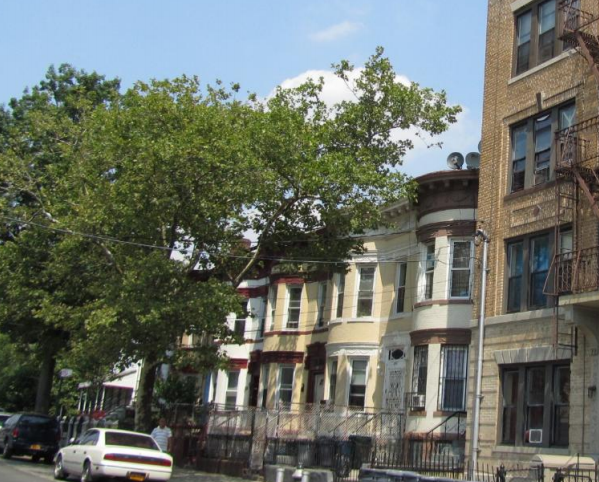
DCP
A side street in East New York.
The application deadline for community-based organizations to participate in administering the city’s new basement conversion pilot program launched in the East New York area is coming up this month.
The application deadline for the basement conversion program is August 15. It will be piloted in the Brooklyn’s Community District 5 which includes Broadway Junction, City Line, Cypress Hills, East New York, Highland Park, New Lots, Spring Creek and Starrett City neighborhoods for the next three years.
For many decades, basements and cellars have been illegal and were considered uninhabitable by the city. According to HPD, the habitation of basement and cellar units has been prohibited largely for public health reasons. Basement and cellar units typically lack light and air, and also retain moisture, leading to potentially unsafe living conditions.
Legal or no, many people live in basements and cellars. Tenants in illegal basement and cellar apartments typically have no lease and limited rights while living in those substandard conditions. Complaining about conditions is not an option for those tenants: Generally, when a property owner is reported to the Department of Buildings for an illegal basement apartment, the city sends out an inspector who hands the landlord a citation and then orders the basement apartment evacuated.
The city launched the pilot conversion program in June as part of the rezoning plan for the Brooklyn neighborhood — itself an element of the overall de Blasio administration’s goal to produce 300,000 apartments by 2026.
The pilot program would help landlords transform some illegal basements apartments into legal, safe and affordable units. An interagency group including that Department of Buildings, Department of Housing Preservation and Development and Department of City Planning will determine how and whether a basement or cellar can be converted into a legal apartment. The new policy will modify requirements in order to reduce costs and facilitate conversion of new residential units.
In order for a basement to be converted into an apartment, it must meet health and fire safety standards including ceiling height, window sizes and requirements for emergency exits and fire safety, according to HPD.
Councilmember Rafael Espinal has been supportive of the basement conversion program that can help landlords with converting their basements into legal affordable homes. According to Espinal’s office, the Councilmember has been working with the community, the mayor’s office and various agencies for over two years on the creation of the pilot program and plans on continuing to partner on its implementation.
HPD will be studying the progress of the pilot program while Espinal plans on introducing legislation to make the basement conversion program available across the city. Espinal’s office has been monitoring the pilot program’s process in the East New York area. Also keeping an eye on it is the Coalition for Community Advancement: Progress for East New York/Cypress Hills, a coalition of neighborhood groups that organized in response to the rezoning, which has been monitoring the roll-out of the rezoning and neighborhood investments. The Coalition for Community Advancement: Progress for East New York/Cypress Hills was involved in coming up with the program for the East New York community during the rezoning process.
According to the Coalition, the pilot program seems to be moving forward but the terms and conditions for keeping the basement apartments for low- to moderate income homeowners and low-income tenants are still being finalized.
The East New York rezoning plan was one of the first rezonings to take place under the de Blasio administration’s affordable housing plan. The basement conversion pilot program came to fruition under the rezoning plan passed in 2016. According to HPD, East New York has an existing building stock of one- and two-family homes that is ideal for the launch of this program.
Homeowners must apply for the basement conversion pilot program through a community-based organization which will be selected by HPD. The community based organization will then help the homeowner apply for financing through another HPD program, which will provide a forgivable, low-interest loan–a mechanism due to launch in the coming months, according to HPD. The de Blasio administration estimates that if the program is successful it could create and/or preserve 5,000 more apartments citywide.
Additionally, with assistance from the selected community-based organization, homeowners will work directly with qualified contractors to renovate their basements in compliance with modified code standards. The architects and contractors will come from a pre-approved list provided by the inter-agency collaboration of HPD, DOB and DCP. In order for homeowners to qualify for the program, they must have an income at or below 165 percent of Area Median Income, which is $154,935 for a three-person household, and occupy the home as their primary residence, according to HPD. In East New York, the median household income is $34,512 per year, and over a third of families earn less than 30 percent of Area Median Income (AMI), or $23,350 for a three-person family, according to HPD.
The Housing New York 2.0 plan includes initiatives such as “Neighborhood Pillars,” which will help nonprofits purchase and renovate 7,500 rent-regulated units in buildings at risk of a speculative sale, and “Partners in Preservation,” in which the Department of Housing Preservation and Development would work with community organizations to develop anti-displacement plans for certain neighborhoods.









2 thoughts on “Pilot Program to Legalize Some Basement Homes Takes Shape in E. New York”
This is a very bad idea. Very few homeowners in ENY or anywhere else will go through the expensive process of properly converting an illegal basement apartment to a legal basement apartment. Also remember that in areas zoned only for 1 or 2 family homes a 2-family house can never legally add a 3rd apartment because it violates the zoning laws.
If anything the NYCDOB and FDNY should be cracking down on existing illegal apartments.
Will HRA pay the rent for their clients? Not so fifty years back. Not with toddlers.